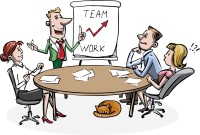- Home
- Business Processes
- Industry Knowledge
- Aerospace Industry
- Automotive Industry
- Banking Domain
- BFSI Industry
- Consumer/ FMCG Industry
- Chemicals Industry
- Engineering & Construction
- Energy Industry
- Education Domain
- Finance Domain
- Hospitality Domain
- Healthcare Industry
- Insurance Domain
- Retail Industry
- Travel and Tourism Domain
- Telecom Industry
- Leadership Skills
- eLearning
- Home
- Leadership
- Team Leadership
- Time Management Skills
Time Management Skills
How often do you have a plan for how you are going to spend your day but you aren't able to complete the tasks on your plan because of unimportant tasks, interruptions, or your own procrastination? Wouldn't it be great to be able to manage your schedule and your time while avoiding, or at least controlling, these time stealers? Learn the strategies to manage your schedule while still handling interruptions and demands on your time.
Meaning of Time
What time means to you and how to identify some of the ways in which you can manage it more effectively?
If you wish to become an effective manager of time you must first understand the nature of what you are attempting to manage. Time in this context is not to be defined philosophically. Most simply, it is of finite duration distinct from eternity. The expression 'time' in the English language as well as in other languages is used in different ways. Spend a few minutes writing down some ideas of what the following phrases mean to you:
- At the same time
- On-time
- Time off
- At times
- From time to time
- Timeless
- In no time
- Timely
- In time
A reflection on the above phrases will enable you to focus on the nuances of meaning that underpin their use in actual contexts. You have probably now got a clearer idea of time. Time in fact is an intangible concept or a paradox. You never have enough time but you have all the time that is available. It is a resource, but if you don't use it, it will disappear and you will never be able to catch hold of it, once gone. You can't increase its quantity, but you can ensure that you use it on things that are important to you.
You might have realized that time is a personal concept which means there is no right or wrong perception of time. Learning to manage time requires commitment and depends on how you approach various activities. Your approach will be influenced by the assumption you make about the nature of your work and the environment in which you live and work. Some assumptions will generally be more useful than others for managing your time effectively.
Meaning of Time Management
One of the most essential skills required by an effective manager and every professional relates to managing the time available and prioritize the long term and short-term goals.
Time management is a process of determining the quality and quantity of work output i.e. the effective utilization of time in performing various activities in the organization. Time management is the discipline of organizing, allocating, and controlling the time you use for activities in such a way that you achieve your desired results.
You as an employee have to perform your activities according to your job description. Your important duty is to see that all the activities are performed as per the job description and with the time limit assigned to the job. Time management will help you to perform your job more effectively and efficiently.
The flow of Time is Unidirectional
Like other resources, 'time' is also an important resource that has got a unique character of having a constant unidirectional forward flow. Time passed, cannot be regenerated nor it can be stored to be utilized later on when needed.
Adequate input of all other resources does not necessarily guarantee achievement up to expectation, if during the planning and implementing all possible efforts were not undertaken to complete the various component tasks in targeted time by effectively utilizing the same.
Why Time Management?
Time management is the discipline of organizing, allocating, and controlling the time you use for activities in such a way that you achieve your desired results. Time is a very valuable resource. The first step towards improving time utilization is to determine how available time is spent on different types of activities. Although managers understand that time is their scarcest resource, few actually take time to get a ‘birds-eye’ view of how they actually spend their time and keep a track of how the priorities they say are the most important fit with the actual way they spend their time. It highlights how to control your time so that you can optimize your productivity. Time management helps us to:
- To provide quality time to your responsibilities
- To decrease expenses through work transformation
- To see that all the staff spends their time as per the activities listed in their job description
- To measure the work output and facilitate quality customer focus
Time management is simply a way of using time effectively. Working faster or working longer are poor strategies for managing time. It is more sensible to identify your priorities and then choose the activities accordingly. In fact managing time is about managing yourself. It is about adapting to a given situation so that you can get the most out of your time for you to do this, you must accept that you can influence and ultimately control the environment in which you live and work. You must learn to spend your time wisely.
Related Links
You May Also Like
-
In today's innovation-driven economy, understanding how to generate great ideas has become an urgent managerial priority. Managers need to encourage and champion ideas and need to help their organizations incorporate diverse perspectives, which spur creative insights and facilitate creative collaboration by harnessing new technologies. Innovation is the embodiment, combination, and/or synthesis of knowledge in original, relevant, valued new products, processes, or services.
-
Benefits of Teams in Workplace
The use of formal work teams is commonplace in modern organizations. But why we have teams? What are the benefits or advantages that teams provide for organizations and employees? Do we really need to adopt formal team structures and use team-building approaches in organizations? Read this article to explore and learn the benefits of having formal teams in organizations.
-
Building Perfect Creative Team
One misconception around creativity is that creative act is essentially solitary. Most of the world's important inventions resulted not from the work of one lone genius, but from collaboration of a team with complementary skills. Managers should build teams with the ideal mix of traits to form a creative group and then establish the conditions that make creativity much more likely to occur.
-
Stress is an essential part of our life. No one can live without stress. Stress can be beneficial as well as harmful. Stress as a positive influence adds excitement and hope while as a negative influence it can result in destructive feelings, anger, and depression. Although the general orientation to stress is to consider unfavorable outcomes, yet one must have observed that stress experiences may also facilitate the development of effective and varied coping behavior, increased personal resources, and lead to a sense of competence in development. Stress at a moderate level is not only inevitable but may be useful for physical and mental well-being.
-
Listening is the foundation for good communication. It is also the hardest skill to master. Do you listen to confirm what you already know, or do you listen to explore and learn new things? How can we create receptive communication as a listener? The real art of listening involves awareness and sensitivity to the feelings of the speaker because it is at the feeling level that genuine connection, relationship, and healing occurs.
-
A good leadership style is something that every effective leader must have in order to succeed, but identifying what that entails or does not entails might be difficult to understand. Most of the research on leadership focuses on the exemplary, best practices, and positive attributes of effective and successful leaders. This article talks about a new approach to learn leadership using lessons from bad leadership. That is the lessons to be learned by examining leaders who have not effectively exercised their power, authority, or influence.
-
Facilitative Leadership is all about involving the employees in the decision-making process at all levels enhancing their sense of ownership, responsibility, and motivation. Facilitative leadership style uses a number of indirect communication patterns to help the group reach consensus and build commitment for the decision taken. To be effective in modern organizations, managers need to become facilitative leaders, learn what it means to be a one.
-
Authentic leadership is an approach to leadership that emphasizes building the leader's legitimacy through honest relationships with followers which value their input and are built on an ethical foundation. The authentic leader acts upon his or her values and beliefs, and inspires others to do the same, is committed to know and develop oneself. Are you committed to developing yourself; know your motivations and the purpose of your leadership? Read this article to know more about authentic leadership style and discovering your authentic self.
-
Recognizing Stress & its Sources
As an individual, you almost certainly know what stress feels like. Stressors are events or situations to which people must adjust. Stressors may be physical or psychological in nature. The level of severity of stress is determined not merely by exposure but the intensity, duration, and frequency of stressors. The sources of stress are many. They arise from multiple areas both with the individual and from the environment.
-
The development of teams is an ongoing process because the composition of the team may keep on changing. The new members may join and the old members may leave the team. The team members pass through several stages for the development of the team and there has been a lot of research to identify these stages. In this article, we discuss the common theories of team development.
Explore Our Free Training Articles or
Sign Up to Start With Our eLearning Courses

About Us
Learning
© 2023 TechnoFunc, All Rights Reserved










